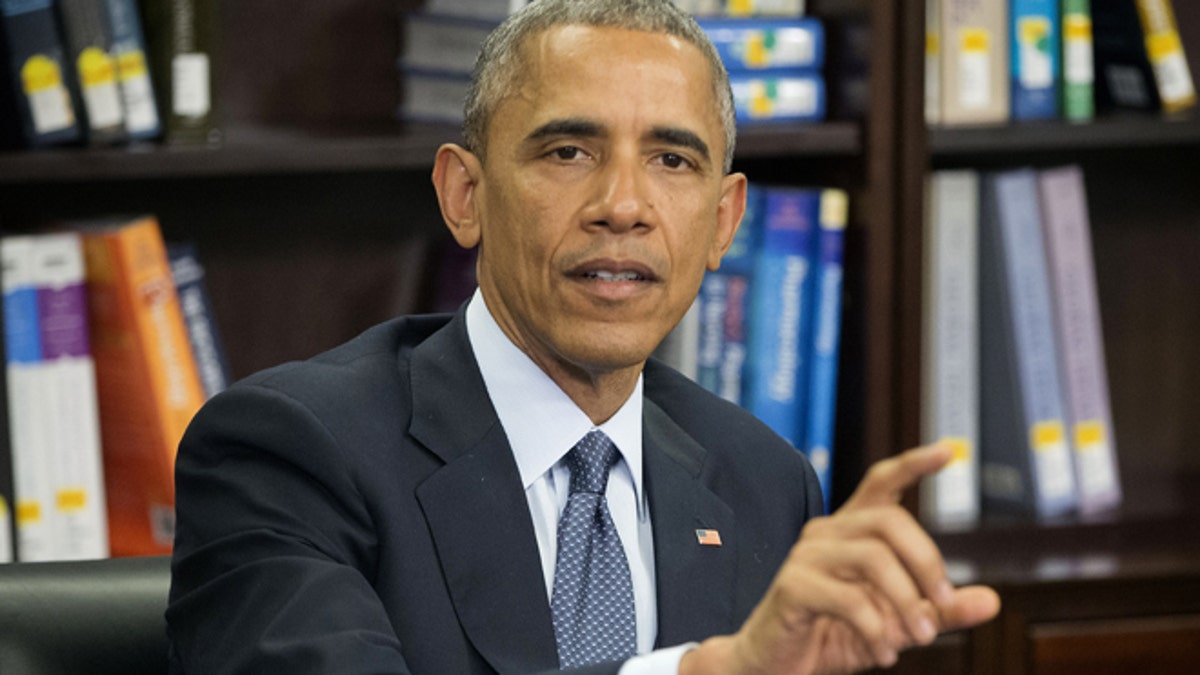
April 7, 2015: President Obama at Howard University in Washington. (AP Photo/Pablo Martinez Monsivais)
EXCLUSIVE: The Obama Administration’s pledge of 26 to 28 percent cuts in U.S. carbon emissions by 2025 is coming under heavy fire from business and scientific experts, who charge the radical goals were not backed up by any concrete planning, likely to cause energy-intensive industries to flee the country at a heavy cost in jobs, and unlikely to make any difference at all to global carbon emissions—or to climate.
The skepticism was aired at a session Wednesday of the House Committee on Science, Space and Technology, where the Republican majority clearly shared those views, and intended to underline them in the early stages of a major pushback against Administration climate policies. As one sign of that strategy, committee chairman Lamar Smith timed the hearing on the costly climate pledges to coincide with “tax day”—the deadline for normal tax filings with the IRS.
But while taxes are allegedly one of life’s rare certainties, skeptical witnesses warned that the same could not be said of the fine print on the Administration’s climate pledges, which they termed sketchy at best, and void of any real signs of concrete planning.
The emissions promise made by the Administration last month as the U.S. contribution to a new global climate treaty intended to be unveiled at a Paris summit in September “raises more questions than it answers,” according to Karen Harbert, head of the U.S. Chamber of Commerce’s 21st Century Energy Institute, in written testimony to the committee.
“Nowhere does it explain how the administration intends to achieve the unrealistic goals it has set out.”
In person, Harbert put the matter even more bluntly: “The Administration’s math just doesn’t add up,” she told committee members.
Those numbers, which include the greenhouse gas cuts embodied in draconian new Clean Power restrictions that the Environmental Protection Agency is expected to unveil this week, still leave the U.S. with “500 to 600 or more” million metric tons of promised cutbacks still unaccounted for, she said.
In other words, “there’s more to come.”
Harbert noted that so far, the Administration has made no reference in its pledge—known in U.N.-speak as the “Intended Nationally Determined Contribution,: or INDC to global carbon reduction—to reductions in emissions from U.S. industrial plants, and said that further carbon restrictions on pulp and paper, iron and steel, and cement industries, among others, could be expected soon.
The result, she predicted, would be “carbon leakage”—simply the movement of a sizeable percentage of those industries to nations with less restrictive rules, including China and India, who will continue “business as usual,” even within a recent relatively vague Chinese promise enshrined in a deal with the Administration to “peak” carbon emissions by 2030.
Even the EPA, she declared, admits that the promised U.S. restrictions will have “no discernable impact” on the global environment. In written testimony, she amplified that even the drastic cuts the EPA is about to mandate for U.S. power plants would be “offset by Chinese carbon dioxide emissions in about three weeks.”
Harbert’s lack of confidence in the Administration’s ability to meet its dramatic pledges—or even its older promise to cut U.S. carbon emissions by 17 percent by 2020—were echoed by Margo Thorning, chief economist for the American Council for Capital Formation, a business lobbying concern.
“We are only down about 9.5 percent now,” she told committee members. Whether they reached the promised levels or not, the likely cost of additional emissions cutbacks would be expressed in rising unemployment figures that developing countries were highly unlikely to imitate, she said, especially as another outcome of the restrictions would be even more sluggish levels of investment in U.S. industry.
Thorning cited a prediction that global energy demand will grow by 37 percent by 2040, in large measure because the “strongest driver” for developing countries “ will be the need for energy for economic growth, not CO2 reductions.”
Even broader concerns about the direction of Administration policy, and the logic of greenhouse gas reduction as an instrument of controlling climate change, came from Judith Curry, a professor of earth and atmospheric sciences at the University of Georgia, who told committee members that recent data—including the lack of real rises in global temperature for the past 18 years have “called into question that human activity is the dominant cause” of global changes in climate activity.
“We need to push the reset button on climate change,” she told the committee, stating that the heavy emphasis on reducing carbon emissions had “stifled the development of a wider range of policy options.”
The sole committee witness who supported the Administration’s position was Jake Schmidt, director of international programs at the Natural Resources Defense Council, who told legislators that the Administration’s efforts would have a “catalyzing impact” on other countries in the ongoing climate change negotiations, and that the Administration’s targets were “essential” to nudging them toward even deeper commitments.
The Administration’s actions would show other countries the “seriousness” of U.S. intentions to control climate change, he said.
It was a position that the Republican majority on the committee, at least, did not seem prepared to take as seriously.
George Russell is editor-at-large of Fox News and can be found on Twitter: @GeorgeRussell or on Facebook.com/GeorgeRussell




